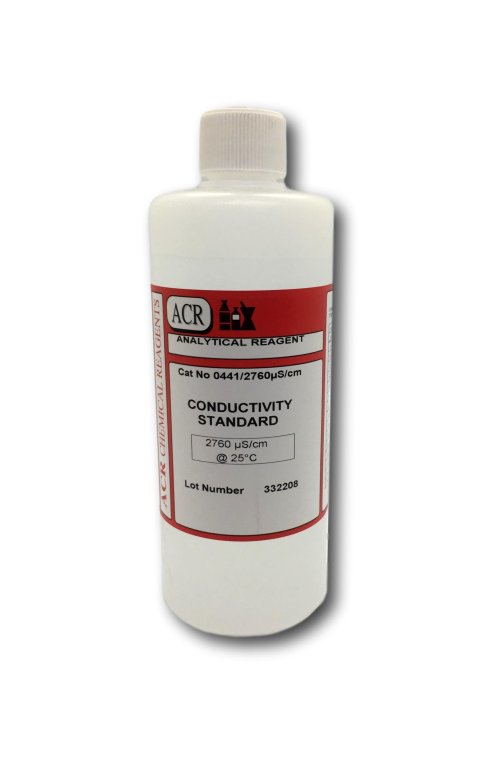Why is KCl used for the Calibration of Conductivity Meters

Calibration using pre-prepared standard solutions is essential if you require accurate and reproducible results using a conductivity meter. Potassium Chloride (KCl) is the most popular calibration solution. This article reveals why KCl is so popular, provides calibration tips and examples of the biggest selling pre-mixed products.
Find out here why KCl performs so well, and how to get calibration right!
What is a Conductivity Meter?
Electrical conductivity (EC) is the measure of the concentration of ions present within a sample. Conductivity is the ability of the substance to transmit an electrical current over a defined area. The measurement unit for electrical conductivity is called Siemens (S), and scientific instruments typically display measured units as MilliSiemens per centimetre mS/cm or MicroSiemens per cm μS/cm.
A conductivity meter measures the level of conductivity within an aqueous solution using either two or four probes. When placed in a liquid sample, the electrodes pass a current through the sample solution. The relative concentration of ions within the sample will determine the conductivity or the resistivity of the sample. Using Ohm's law and the known distance between the electrodes, a meter can calculate the solution's conductivity under test. While this doesn't sound very easy, most conductivity meters perform this measurement within seconds.
Why Calibrate a Conductivity Meter with KCl?
The calibration of a conductivity meter is an essential maintenance function. Routine calibration results in consistent and dependable readings. The frequency of calibration required will vary depending on your intended use. For example, if you are using the meter for checking your home aquarium, weekly calibration would be adequate. For professional or everyday use, we advise daily calibration.
The most common solution for the calibration of conductivity meters is potassium chloride (KCl) because it is soluble and stable. The composition of conductivity standard solutions is a ratio of KCl: Water. The required ion concentration level of the standard solution determines the mix ratio.
Tips for the Calibration of a Conductivity Meter Using KCl
While the method for the calibration of your conductivity meter using KCl will vary between different makes and models, our scientific team always advises five tips for accurate and straightforward calibration.
- Rinsing: Always begin by rinsing your meter’s electrode in deionised water to ensure the sensor is free of dirt or dust that could cause errors.
- Check your meter’s ideal calibration temperature: Your conductivity meter’s manual specifies the ideal temperature for calibration - usually an ambient temperature between 20-25°C.
- Check what concentration of solution your meter requires for calibration: Again, consult your user manual.
- Always use a fresh KCl solution and choose a plastic container. Avoid using metal containers - these will interfere with calibration.
- Preferably use a commercially produced standard KCl solution: It’s more convenient, and your results will be more reliable.
KCl Calibration Standard Solutions
Commercially available KCl conductivity calibration standard solutions come pre-prepared and ready to be dispensed into clean containers. Instrument Choice offers several standard solutions of varying concentrations. We feature the two most popular products below:
1. Conductivity Calibration Solution (1413uS-cm) 500 ml%20500%20ml.jpg)
Product Code: 1413-500
1413uS/cm Calibration Solution is the most common and best-selling concentration of calibration solution. The 1413uS/cm solution is also available in 250mL bottles.
 2. Conductivity Calibration Solution (2760uS-cm) 500 ml
2. Conductivity Calibration Solution (2760uS-cm) 500 ml
Product Code: 2760-500
We recommend the 2760uS/cm calibration solution as the outstanding option for meters requiring multi-point calibration. View the 2760uS/cm SDS here.
Other available KCl conductivity calibration standards are;
3. 84 uS/cm KCl Calibration Solution Product Code: EC-CON-84BT
4.100 uS/cm KCl Calibration Solution Product Code: EC-CON-100BT
5.500 uS/cm KCl Calibration Solution Product Code: EC-CON-500BT
6.2764 uS/cm KCl Calibration Solution Product Code: EC-CON-2764BT
7.5.0 mS/cm KCl Calibration Solution Product Code: EC-CON-5000BT
8.12.88 mS/cm KCl Calibration Solution Product Code: EC-CON-1288BT
9.111.8 mS/cm KCl Calibration Solution Product Code: EC-CON-1118BT
Conclusion
As a result of its solubility, stability and conductive qualities, KCl is the standard solution used to calibrate conductivity meters. Most pre-prepared standard solutions are a mix of KCl and water. The mix ratio and temperature specified for different meters will vary, so always consult your user manual.
Need a hand finding the right KCl conductivity calibration solution for your needs? Speak with an Instrument Choice Scientist! We're here and ready to help! Call 1300 737 871 or email [email protected].

Also interesting
The Fluke 62 Max is a popular infrared thermometer suitable for a wide range of uses. The unit features:
- a laser pointer
- a 10:1 distance to spot ratio
- a wide measurement range
- an IP54 rating (for water and dust resistance); and
- a design certified to withstand a 3-metre drop.
As a result of these convenient and life-proofing features, the Fluke 62 Max is commonly used by builders, in workshops, warehouses, and any application that requires precise surface temperature measurements while on the go.

The Loggerflex Bun range of intelligent, wireless WiFi data loggers are renowned for ease-of-use, reliable SMS and email alarms, an intuitive web and mobile platform, and ultra-long battery life (up to 10 years!)
This article shows you how to set up the popular Hygro wireless temperature humidity sensor – a device that’s an exceptional logger for general monitoring applications such as:
- home and retail store fridges/freezes
- storage facilities
- museums; and
- greenhouses.
Ensure you never miss an alarm again - learn how to set up a Bun Hygro Wireless Temperature and Humidity Sensor to monitor your temperature and humidity sensitive environment!

